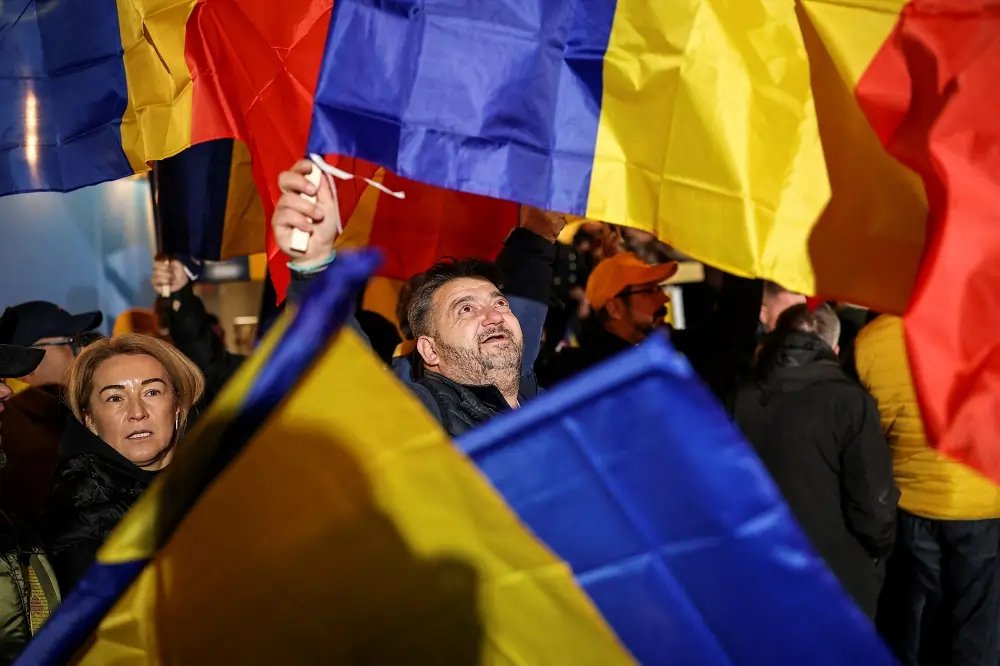US concerned about potential interference in Romanian election
Published by Jessica Weisman-Pitts
Posted on December 5, 2024
4 min readLast updated: January 28, 2026

Published by Jessica Weisman-Pitts
Posted on December 5, 2024
4 min readLast updated: January 28, 2026

By Luiza Ilie
BUCHAREST (Reuters) -The U.S. voiced concern about potential foreign interference in Romania’s presidential election after the declassification of documents showing the country was a target of “aggressive hybrid Russian attacks” during a period of three consecutive ballots.
Having previously polled in single digits, pro-Russia ultranationalist Calin Georgescu surged to victory in the first presidential election round on Nov. 24, causing widespread surprise in the European Union and NATO member state.
Documents declassified by Romania’s top security council on Wednesday showed Georgescu was massively promoted on social media platform TikTok through coordinated accounts, recommendation algorithms and paid promotion. Georgescu has declared zero funds spent in the campaign.
They also showed compromised login data to Romanian election websites and over 85,000 cyber attacks during the election. Romania’s intelligence agency said the campaign’s size, methods and coordination pointed to a foreign state.
In a statement, the U.S. State Department said Washington is concerned about the council’s report “of Russian involvement in malign cyber activity designed to influence the integrity of the Romanian electoral process”.
“Romania’s hard-earned progress anchoring itself in the transatlantic community cannot be turned back by foreign actors seeking to shift Romania’s foreign policy away from its Western alliances,” it said in a statement.
Any such change would have serious negative impacts on U.S. security cooperation with Romania, while a decision to restrict foreign investment would discourage U.S. companies from continuing to invest in Romania.
The European Commission meanwhile issued a “retention order” to TikTok ordering the platform to freeze and preserve data related to actual or foreseeable risks its service could pose on electoral processes and civic discourse in the 27-nation bloc.
“The Commission is ordering preservation of documents and information regarding any systematic infringement of TikTok’s terms of service prohibiting the use of monetisation features for the promotion of political content on the service,” it said.
The order applied to elections in the EU in the period between November 2024 through March 2025, it added.
“We have already been cooperating with the Commission and will continue to do so,” a TikTok spokesperson said in an email. “We look forward to establishing the facts in light of some of the speculation and inaccurate reports we have seen.”
Russia has previously denied any interference in Romania’s election campaigns and TikTok has denied it gave Georgescu preferential treatment, though it said it removed suspect networks of accounts only after the first presidential round.
GEORGESCU LEADING POLLS
An opinion poll by AtlasIntel, conducted Dec. 2-4 and quoted by news website hotnews.ro, showed Georgescu would defeat centrist leader Elena Lasconi in the Dec. 8 presidential run-off by a 47%-43% margin. About 6.5% of those polled said they would spoil their ballot.
However, the poll also showed 57% of Romanians had more confidence in Lasconi than Georgescu to keep Romania anchored in the EU and NATO.
Georgescu, 62, is a far-right, self-styled outsider who says he will end Romanian aid to Ukraine against Russia’s invasion and says he considers Russian President Vladimir Putin a true leader and patriot, while being critical of NATO and Brussels.
A Georgescu victory in Sunday’s runoff election would isolate Romania abroad and reverse its pro-European approach, analysts and diplomats have said.
On Wednesday, Romanian pro-European parties that were elected to parliament in a Dec. 1 ballot agreed to form a governing majority meant to keep out far-right and ultranationalist groupings that won a third of seats. Negotiations will follow.
Bucharest’s blue chip index was down 0.5% on Thursday, extending losses from the previous session.
(Reporting by Luiza Ilie and Anna Wlodarczak-Semczuk; Additional reporting by Charlotte Van Campenhout in Brussels and Alan Charlish in Warsaw; editing by Mark Heinrich)
Cybersecurity is the practice of protecting systems, networks, and programs from digital attacks. These attacks are usually aimed at accessing, changing, or destroying sensitive information or disrupting normal business operations.
Foreign investment refers to the investment made by individuals or entities in one country into assets or businesses in another country, often to gain returns or influence in the foreign market.
Explore more articles in the Top Stories category











